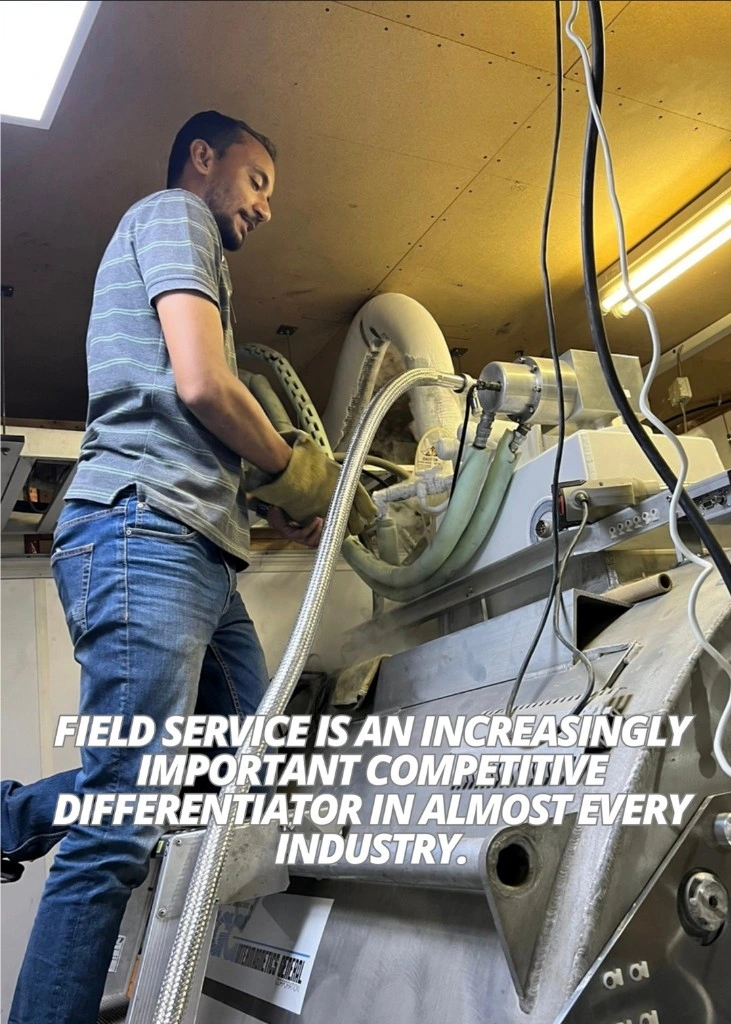How can Artificial Intelligence make Field Service Engineers more effective?
This article looks at the advantages and challenges of Field Service Engineers and Artificial Intelligence. The author Ahmed Helmy El Sheikh is an MRI/CT Field Service Engineer for Philips and discusses this key issue.


Is there a battle between FSEs and Artificial Intelligence?
Introduction
In the ever-evolving landscape of healthcare, the role of field service engineers (FSEs) and artificial intelligence (AI) has become pivotal. Both bring unique strengths to the table, contributing significantly to the maintenance and functionality of critical medical equipment. However, they operate in distinct ways, each with its set of advantages and challenges.


FSEs in the medical field are irreplaceable
Field Service Engineers are the human touch in healthcare technology management. That’s because, they are the experts responsible for installing, maintaining, and repairing medical equipment, ensuring that it operates optimally. Here are three key points to consider.
Expertise and adaptability
FSEs possess invaluable expertise and adaptability. Therefore, they can diagnose complex issues, calibrate sensitive instruments, and provide immediate solutions based on their experience.
Patient interaction
In many cases, FSEs work directly with healthcare providers and patients. Their interpersonal skills are crucial when explaining technical issues to non-technical staff and ensuring minimal disruption to patient care.
Complex repairs
FSEs excel in handling intricate repairs and maintenance tasks, especially for older or specialized equipment that may not be fully compatible with AI.
Collaboration and synergy
Rather than viewing Field Service Engineers and Artificial Intelligence as competitors, the future lies in their collaboration.


FSEs can harness the power of AI to streamline their tasks, thus making maintenance more efficient and accurate.
AI, in turn, can benefit from the experience and human touch of FSEs when dealing with unique or unforeseen situations.
In summary, field service engineering remains indispensable in the medical field for its expertise, adaptability, and human interaction. AI complements FSEs by adding predictive capabilities, remote monitoring, and operational efficiency. Therefore together, they create a powerful synergy that enhances patient care and the reliability of healthcare equipment. The future of healthcare maintenance lies not in AI vs. FSE but in AI working alongside FSEs to deliver the best possible outcomes for patients and healthcare providers.
Challenging Questions about Field Service Engineers and Artificial Intelligence
Question 1
What are the primary ways in which AI is impacting field service engineering in the healthcare industry?
AI is significantly impacting field service engineering in healthcare through these four areas.
Predictive maintenance
AI can analyse equipment data to predict when medical devices need maintenance or repairs, reducing downtime and ensuring patient safety.
Efficient scheduling
AI algorithms optimize service technician schedules, therefore ensuring timely responses to service requests and minimizing travel time.
Remote monitoring
AI-enabled sensors can remotely monitor medical equipment, alerting technicians to issues before they become critical.
Enhanced diagnostics
AI can assist technicians in diagnosing equipment problems by analysing data and providing recommendations.
Question 2
How does AI improve the efficiency of field service in healthcare?
AI enhances efficiency in several ways particularly these three.
Reduced downtime
Predictive maintenance and remote monitoring prevent unexpected equipment failures, and so minimizing downtime in healthcare facilities.
Optimized scheduling
AI schedules field service visits efficiently, reducing travel time and ensuring prompt responses to emergencies.
Inventory management
AI helps in managing spare parts inventory, ensuring technicians have the right parts when needed.
Question 3
What are the benefits of AI-driven diagnostics for healthcare equipment?
AI-driven diagnostics offer these three benefits.
Accuracy
AI can analyse vast datasets quickly and accurately, Aiding FSE in identifying equipment issues.
Faster repairs
Quicker diagnosis leads to faster repairs, minimizing equipment downtime.
Cost savings
Preventative maintenance based on AI diagnostics can extend equipment lifespan and reduce repair costs.


Question 4
Are there any challenges associated with implementing AI in field service engineering for healthcare?
Yes, there are challenges.
Data security
Handling patient data and medical equipment data requires robust security measures.
Integration
Integrating AI systems with existing healthcare infrastructure can be complex.
Training
FSEs need training to use AI tools effectively.
Question 5
How can healthcare organizations ensure the ethical use of AI in field service engineering?
To ensure ethical use, organizations should do the following four things.
Transparency
Clearly communicate how AI is used in field service.
Data privacy
Protect patient data and ensure compliance with regulations like HIPAA.
Regular auditing
Regularly review AI algorithms and systems for bias and fairness.
Ethics guidelines
Develop and adhere to ethical guidelines for AI usage.


Question 6
What are the long-term implications of AI in healthcare field service engineering?
Long-term implications include the following four points.
Cost savings
AI-driven maintenance can reduce operational costs in the long run.
Improved patient care
Reliable equipment ensures better patient care and safety.
Advancements in healthcare technology
AI drives innovation in medical equipment and services.
Skilled workforce
FSE may need new skills to work with AI-enabled systems.
Question 7
How does AI ensure the quality and safety of medical equipment in healthcare field service engineering?
AI ensures quality and safety by continuously monitoring equipment performance, detecting anomalies, and triggering maintenance alerts, thereby preventing potential safety risks. Therefore, it plays a crucial role in maintaining medical devices that meet regulatory standards.
Question 8
In what ways does AI-powered telehealth support benefit field service engineers in healthcare?
AI-powered telehealth support allows field service engineers to remotely diagnose and troubleshoot medical device issues. This real-time guidance aids in efficient repairs and reduces the need for physical presence, especially in critical situations.
Question 9


How does AI assist in inventory forecasting for spare parts in healthcare field service engineering?
AI leverages historical data and usage patterns to predict which spare parts will be needed in the future. This proactive approach ensures that healthcare facilities maintain adequate inventories of critical components, reducing downtime.
Question 10
How can AI-powered training simulations enhance the skills of field service engineers in healthcare?
AI-powered training simulations provide realistic scenarios for field service engineers to practice maintenance procedures on virtual medical equipment. Hence, this immersive training enhances their skills, preparing them for real-world challenges.
Summary of how can Artificial Intelligence make Field Service Engineers more effective
In summary, Field Service Engineers and AI in healthcare are not competitors but collaborators. Service Engineers bring expertise and a human touch, while AI is a tool with predictive power and efficiency. Together, they enhance patient care and equipment reliability.
The author


Ahmed Helmy El Sheikh is an MRI/CT Field Service Engineer for Philips based in Cairo in Egypt. Ahmed has a degree in Biomedical/Medical Engineering as well as an MBA.
His passion is learning new technologies, research and development and solving problems.
Further reading
How AR is improving and enriching the life of a field engineer


Responses